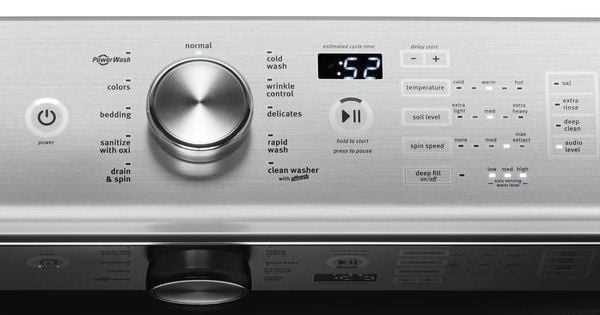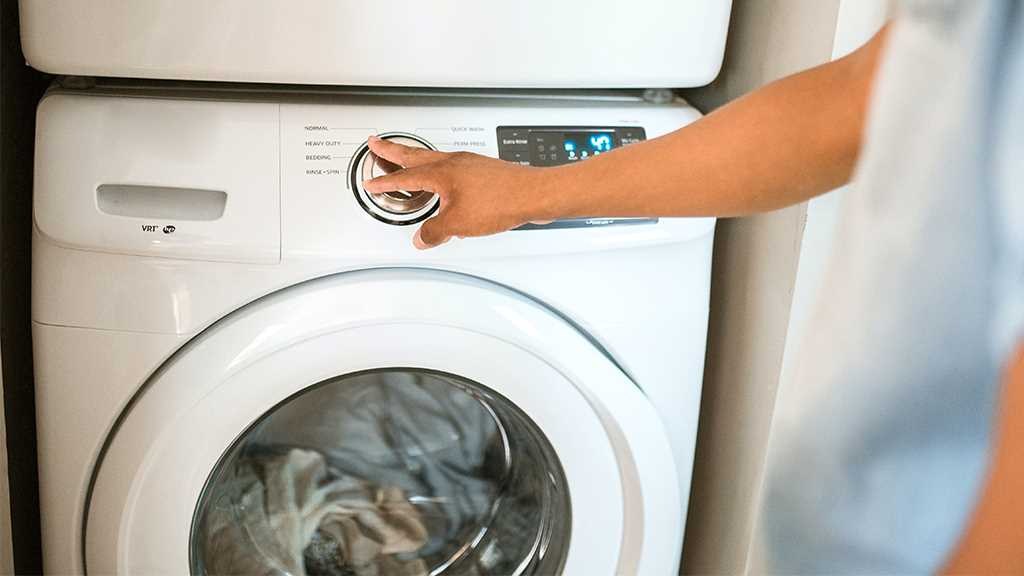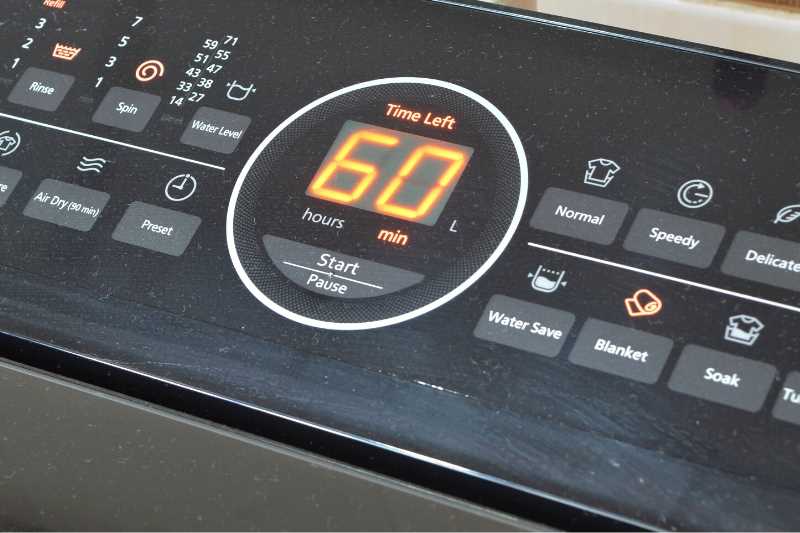




Have you ever noticed that your washing machine seems to take forever to complete a cycle? You set the timer for an hour, but then it keeps adding more and more time. It can be frustrating and confusing, especially when you have other tasks to take care of. But fear not, we are here to solve this mystery for you.
One possible reason why your washing machine keeps adding time is because it detects that your clothes are still not fully clean or rinsed. Modern washing machines are equipped with sensors that can measure various factors, such as the amount of dirt or the level of suds in the water. If the sensors deem that your clothes are not yet clean, the machine will automatically add extra time to ensure a thorough cleaning.
Another reason for the extra time could be due to unbalanced loads. If the machine senses that the load is not distributed evenly, it will try to redistribute the items to create a balance. This process can take some time and may result in additional minutes being added to the cycle. However, it is important to note that an unbalanced load can also be a sign of a problem with the machine, such as a faulty motor or suspension system.
In some cases, the extra time could simply be a result of user error. It is possible that you are selecting the wrong cycle or setting the wrong temperature, which can affect the estimated completion time. It is always a good idea to double-check the settings before starting a wash. Additionally, overloading the machine can also lead to longer cycles, as the clothes need more time and space to move around and get clean.
So, the next time your washing machine keeps adding time, don’t panic. Check for any unbalanced loads or incorrect settings, and make sure to properly distribute the items and select the appropriate cycle. If the problem persists, it may be worth contacting a professional to inspect your machine for any underlying issues. Remember, a little detective work can go a long way in solving the mystery of the never-ending washing machine cycle.
Reasons Behind the Increasing Washing Time
There can be several reasons why your washing machine keeps adding time to the washing cycle. It is important to understand these factors in order to troubleshoot and resolve the issue. Here are some common reasons:
1. Unbalanced Load

One reason for the increasing washing time could be an unbalanced load. When the laundry inside the drum is not distributed evenly, it can cause the machine to spin at a slower speed or even stop altogether. The machine detects this imbalance and tries to redistribute the load, thus adding extra time to the cycle.
2. Overloaded Machine
Overloading the washing machine can also lead to increased washing time. When the drum is filled beyond its capacity, the clothes don’t have enough space to move freely, hindering the efficiency of the wash cycle. As a result, the machine may need to run longer to ensure proper cleaning.
3. Clogged or Faulty Drainage System
A clogged or faulty drainage system can cause the water to drain slowly or not at all, which can lead to extended washing times. If the machine detects that the water is not draining properly, it may add extra time to the cycle to compensate for this issue.
4. Water Supply Issues
Problems with the water supply, such as low water pressure, can also contribute to increased washing time. If the machine does not receive an adequate amount of water within a certain timeframe, it may prolong the cycle to ensure thorough cleaning.
5. Malfunctioning Sensors or Control Board
In some cases, the washing machine’s sensors or control board may be malfunctioning, causing it to incorrectly detect or interpret certain conditions. This can result in unnecessary time additions to the washing cycle. Professional repair or replacement of these components may be necessary to resolve the issue.
6. Long Pre-Wash or Pre-Soak Settings
Some washing machines have pre-wash or pre-soak settings that can add extra time to the overall cycle. If you have selected these options, it’s important to consider their impact on the total washing time.
By understanding these possible reasons, you can troubleshoot and address the increasing washing time of your machine more effectively. It is recommended to consult the manufacturer’s manual or seek professional assistance if the issue persists.
Overloaded Laundry Hampers Efficiency

One common reason why a washing machine keeps adding time to the cycle is an overloaded laundry load. When you overload the washing machine, you put more strain on the motor and other components, which can lead to inefficient washing cycles.
Here are a few reasons why an overloaded laundry hamper can hamper efficiency:
- Poor cleaning results: When there are too many clothes in the drum, the detergent may not be able to circulate properly, resulting in poor cleaning performance. Some clothes may not get enough exposure to water and detergent, leading to underwashed garments.
- Uneven distribution: Overloading the washing machine makes it difficult for the load to distribute evenly. This can cause the drum to become imbalanced, leading to excessive shaking and increased wear and tear on the machine.
- Inefficient water usage: An overloaded laundry load requires more water to adequately cover all the clothes. This can lead to excessive water usage, wasting both water and energy.
- Longer drying times: When the washing machine is overloaded, the clothes may not spin and drain properly. This can leave them heavier and wetter than they should be, resulting in longer drying times and increased energy consumption in the dryer.
- Damaged clothing: Overloading the washing machine can cause clothes to become tangled, twisted, or stretched out. Delicate items may get damaged during the washing cycle, reducing the lifespan of your clothing.
To ensure efficient washing cycles and prolong the life of your washing machine, it is recommended to follow the manufacturer’s guidelines and avoid overloading the laundry hamper. By maintaining a balanced load and allowing proper circulation of water and detergent, you can achieve better cleaning results and efficient washing cycles.
| Tip | Description |
|---|---|
| Sort your laundry | Separate the clothes based on fabric type, color, and level of dirtiness to create balanced loads. |
| Follow the recommended load capacity | Refer to the manufacturer’s guidelines to determine the maximum load capacity of your washing machine. |
| Leave room for movement | Give the clothes some space to move freely inside the drum and prevent tangling. |
| Use the correct amount of detergent | Follow the detergent packaging instructions to ensure proper cleaning without excess suds. |
| Consider multiple loads | If you have a large amount of laundry, splitting it into multiple loads will help maintain efficiency. |
By taking these precautions and avoiding overloading the washing machine, you can enjoy efficient washing cycles and prolong the lifespan of your appliance and clothing.
Water Pressure Variation Impacts Wash Duration
The water pressure in your home can have a significant impact on the duration of your washing machine’s cycle. Fluctuations in water pressure can cause the machine to add extra time to ensure that clothes are properly cleaned and rinsed.
1. Low Water Pressure: If your home has low water pressure, the washing machine will take longer to fill up. This is because the machine needs to compensate for the weaker water flow by extending the filling time.
2. High Water Pressure: Conversely, high water pressure can also lead to longer wash cycles. When the water pressure is too high, the washing machine needs to slow down the water flow to prevent damage to the clothes and the machine itself. This reduction in flow rate means that the machine will need to run longer to ensure proper washing and rinsing.
3. Water Pressure Fluctuation: In some cases, you may experience fluctuations in water pressure during the wash cycle. This can occur if other appliances or faucets are using water at the same time. When the water pressure drops, the washing machine may extend the cycle to maintain water levels and ensure effective cleaning.
4. Water Pressure Considerations: To optimize wash duration, it is important to ensure that your home’s water pressure is within the recommended range for your washing machine. If you have consistently low or high water pressure, consider contacting a plumber to evaluate and address the issue.
5. Other Factors: It is worth noting that while water pressure can impact wash duration, other factors such as load size, fabric types, and wash settings also play a role. Always follow the manufacturer’s guidelines and select appropriate wash settings for your specific laundry needs to achieve the best results.
Filtration System Clogging Leads to Longer Cycles

One of the main reasons why the washing machine keeps adding time to the cycle is that the filtration system may be clogged. The filtration system is responsible for trapping lint, debris, and other particles from the water, preventing them from circulating back into the machine and potentially causing damage to clothes and the washing machine itself.
Over time, the filtration system can become clogged with accumulated lint and debris. When this happens, the water flow is restricted, and the washing machine has to work harder to complete the cycle. This results in longer washing cycles and may also lead to incomplete cleaning of clothes and poor rinsing.
There are several signs that indicate a clogged filtration system. One common sign is an increase in the amount of lint and debris left on clothes after washing. Additionally, you may notice that the water drains slowly during the washing cycle, and there may be a foul odor coming from the washing machine.
To resolve this issue, it is important to regularly clean and maintain the filtration system. The exact process may vary depending on the type of washing machine you have, but generally, it involves removing the filter or lint trap and cleaning it thoroughly. You may need to use a brush or a soft cloth to remove any accumulated debris.
It is also a good idea to check the manufacturer’s recommendations for maintenance and follow any suggested cleaning schedules. Some washing machines have self-cleaning cycles specifically designed to remove lint and debris from the filtration system.
If the filtration system continues to clog frequently, you may need to consider additional measures such as installing a lint trap or using a water softener to prevent mineral buildup.
By maintaining a clean and functional filtration system, you can help prevent clogs and keep your washing machine running efficiently, reducing the occurrence of longer washing cycles and ensuring clean and fresh-smelling clothes after each wash.
Unbalanced Loads Extend Washing Time
One common reason why a washing machine keeps adding time to the cycle is due to unbalanced loads. When the laundry inside the machine is not distributed evenly, it can cause the machine to become unbalanced during the spin cycle.
How does an unbalanced load occur?
An unbalanced load can occur when you have a small number of heavy items or a large number of lightweight items. For example, if you are washing a single heavy bath towel with several lightweight t-shirts, the machine may become unbalanced.
What happens when the load is unbalanced?
When the load is unbalanced, the washing machine’s sensors detect the imbalance and attempt to redistribute the weight by stopping and rearranging the laundry. This process can add extra time to the cycle as the machine tries to correct the imbalance.
How to prevent unbalanced loads?
Here are a few tips to prevent unbalanced loads:
- Make sure to evenly distribute the laundry inside the machine. Avoid placing all the heavy items on one side and the lightweight items on the other.
- Try to mix different types of fabrics and sizes of clothing in each load to help distribute the weight more evenly.
- If you are washing bulky items, such as comforters or pillows, consider washing them individually to prevent an unbalanced load.
- Follow the manufacturer’s guidelines for maximum load capacity. Overloading the machine can increase the chances of an unbalanced load.
What to do if the load becomes unbalanced?
If your washing machine becomes unbalanced during a cycle, there are a few steps you can take to correct the issue:
- Pause the cycle and wait for the machine to completely stop.
- Open the door and manually rearrange the laundry. Try to redistribute the weight more evenly.
- Close the door and resume the cycle. The machine should attempt to balance the load again.
If the machine continues to have trouble balancing the load, you may need to remove some items and run a smaller load.
Conclusion
Unbalanced loads can extend the washing time as the machine attempts to redistribute the weight. By properly distributing the laundry and following the manufacturer’s guidelines, you can prevent unbalanced loads and ensure a more efficient washing cycle.
Sensor Malfunction Causes Time Additions
One of the main reasons why a washing machine may keep adding time to the cycle is due to a sensor malfunction. The sensor is responsible for detecting the water temperature, load size, and level of dirtiness and adjusting the duration of the wash accordingly. However, if the sensor is not working properly, it may miscalculate these factors and inaccurately extend the cycle.
There are a few common sensor malfunctions that can cause the washing machine to continuously add time:
1. Faulty Water Temperature Sensor
The water temperature sensor measures the temperature of the water in the washing machine. If the sensor is faulty, it may not be able to accurately detect the temperature. As a result, the machine may add extra time to the cycle to compensate for the potential temperature fluctuations.
2. Incorrect Load Size Detection
Another sensor that can malfunction is the load size sensor. This sensor determines the size of the load and adjusts the cycle duration accordingly. When this sensor is faulty, it may wrongly detect a smaller load than what is actually inside the machine, causing it to add more time to the cycle to ensure proper cleaning.
3. Malfunctioning Dirt Level Sensor
The dirt level sensor is responsible for detecting the level of dirtiness on the clothes. If this sensor malfunctions, it may not accurately determine the dirt level and could add additional time to ensure a thorough cleaning.
When any of these sensors are not functioning properly, the washing machine’s internal computer may compensate by extending the cycle. To fix this issue, it’s important to identify which sensor is malfunctioning and replace it accordingly.
It is recommended to consult the washing machine’s user manual or contact a professional technician to diagnose and repair the sensor malfunction. Regular maintenance and cleaning of the washing machine can also help prevent sensor malfunctions and ensure smooth operation.
FAQ
Why does my washing machine keep adding time?
There are several possible reasons why your washing machine keeps adding time. One reason could be that the load of clothes you are washing is too large, causing the machine to run longer in order to properly clean the items. Another reason could be that the machine is sensing an imbalance in the load and is attempting to redistribute the items more evenly. Additionally, the machine may be detecting an issue with the water pressure or temperature, causing it to adjust its cycle time accordingly. Finally, it is also possible that there is a malfunction or error in the machine’s control panel, which is causing it to inaccurately display the time remaining.
Is it normal for a washing machine to keep adding time?
It is not normal for a washing machine to constantly add time to its cycle. While small adjustments in cycle time may occur to accommodate different factors, such as load size or water temperature, if your washing machine is consistently adding large amounts of time to its cycle, there may be an issue with the machine that needs to be addressed.
What can I do if my washing machine keeps adding time?
If your washing machine keeps adding time to its cycle, there are a few steps you can take to try and resolve the issue. First, check the load size and make sure it is not too large for the machine to handle. If the load size is appropriate, make sure the machine is properly leveled and not experiencing any imbalances. Additionally, check the water pressure and temperature to ensure they are within the recommended range. If these steps do not solve the problem, it may be necessary to consult a professional technician to diagnose and repair any potential malfunctions.
Why does my washing machine always show more time remaining?
If your washing machine always shows more time remaining than is actually needed for the cycle, there may be an issue with the machine’s control panel or timer. This could be due to a malfunction or error in the system. It is recommended to consult a professional technician to evaluate and repair any potential problems with the control panel or timer.
Can I fix the issue of my washing machine adding time myself?
While there are some troubleshooting steps you can take to try and resolve the issue of your washing machine adding time, it is generally recommended to consult a professional technician for repairs. Fixing the internal components of a washing machine requires specialized knowledge and tools, and attempting to fix it yourself could potentially result in further damage to the machine. A professional technician will be able to diagnose the issue accurately and make the necessary repairs to ensure your washing machine functions properly.














